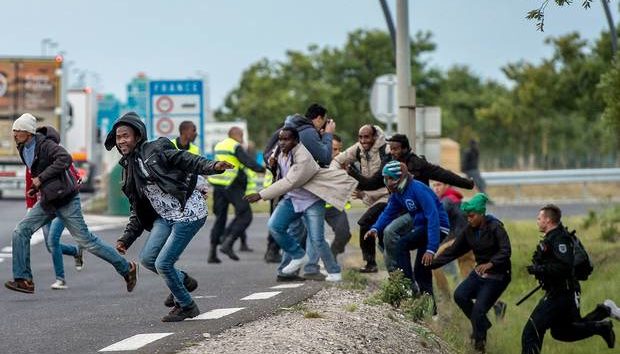Migrants: A Much Needed Debate
One sign that people are bereft of policy-proposals is when, in the face of a huge political challenge, they focus on their opponents’ language. Perhaps it is a symptom of the fact that we are sliding into ‘silly season’ in the UK, but the reporting of the migrant crisis has reached a nadir of silliness. At the time of writing the situation at Calais is a focal point of intense interest. At least one man has died, and many others have been involved in running battles with French police and border guards while trying to enter the Channel Tunnel to get to Britain. The inevitable response of the media is not just to report it but to find a culprit and declare ‘something must be done.’
In reality this problem, as we have noted here before, may be far beyond any one government to affect. The UK border police can keep the borders secure, and they seem – along with their French counterparts – to be doing a fairly good job at that. But they cannot solve the problem. The entire British government is not in a position to stabilise the countries from which people are fleeing. They cannot stabilise Syria, and nor is the government in a position to improve the quality of life and opportunities for young men forced into the hell of the Eritrean army. The root of the matter is therefore beyond our control. But as that mass of peoples moves up through Africa and pushes out from North Africa it comes into proximity with our continent; then there are things that can be done.
A better way of dealing with the migrants who arrive is an obvious priority. But to do that we need a proper debate. For instance, a politician from any party could suggest what may end up having to be the answer anyway, which is for the EU to pay for centres in North Africa – perhaps in Tunisia (or elsewhere) – where the migrants are assessed, their status and cases suitably adjudicated. This is not the only option, but it is one. But it is far away from the centre of the political debate.
Instead once again the debate has become a debate about language. The UKIP leader Nigel Farage has tried to buy some sympathetic political capital by proclaiming that he would not have used the word ‘swarm’ (passingly used by David Cameron) to describe the movement of migrants. This is reminiscent of the debate under the last Labour government and the use of the word ‘swamp.’ Labour leadership contender Andy Burnham has also criticised the Prime Minister’s use of the word ‘swarm’, branding it ‘disgraceful’ and even trying to weaponise the matter into a class issue.
But none of this – however fascinating it might be to some – is any more than wordplay. At best it is a suitable subject for a debating society. But the migrant crisis situation is not a debating society or a discussion group on issues surrounding sensitive language. It is something which is going on which intricately relates to the lives of hundreds of thousands of migrants and will affect the lives and attitudes of hundreds of millions of European citizens. This deserves a proper political debate, and a proper discussion on policy. If we care about the future of our continent then the luxury of word-games is not a replacement for that discussion.

FROM THE DIRECTOR’S DESK
I woke up this morning to news of a horrific arson attack by settlers in the West Bank near Nablus against Palestinians, which resulted in the death of an 18 month old baby burned alive in his house.
It is difficult to comprehend what kind of madness would lead to the loss of innocent life in this way. The incident has been quite rightly deemed a “horrific, heinous” crime that is “a terror attack in every respect” by Israeli Prime Minister Binyamin Netanyahu, who has pledged to hunt down the assailants.This revulsion has been shared across the Israeli political spectrum, with leaders of all parties pledging swift action to bring those responsible to justice.
I have never subscribed to the idea that settlements are the reason why there is no peace between Israelis and Palestinians. It seems to me self-evident that if the settlements were removed tomorrow, there would not be peace. Indeed, we know that agreement on settlements has been reached on several occasions in various peace talks, only for them to flounder on other matters such as the ‘Right of Return’.
However, it is clear that incidents such as this cannot help build trust between Israelis and Palestinians, and that the Israeli government has a problem of control at the extreme end of the settler movement. Fortunately – and in marked contrast to the terrorists of Hamas and the terrorist sympathisers of the Palestinian Authority who think nothing of glorifying ‘martyrs’ who murder Israeli civilians – this is something the Israeli government is aware of.
And in this fact, we have some hope. For there are murderers and criminals in every society. It is how national authorities respond to them that provides an indication of true civilisation.
Dr Alan Mendoza is Executive Director of The Henry Jackson Society
Follow Alan on Twitter: @AlanMendoza
EDITORS NOTE: The featured image is of Calais, France where Africans are making a run for the tunnel and the UK.



Leave a Reply
Want to join the discussion?Feel free to contribute!